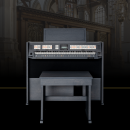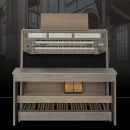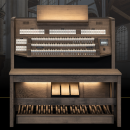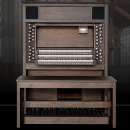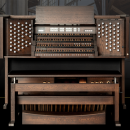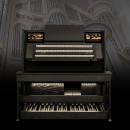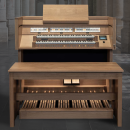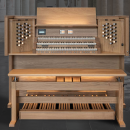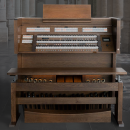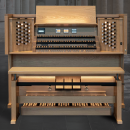
Why choose a church organ from Content?
Advice to buy a church organ
The decision to purchase a (new) church organ for your church congregation is not a simple one. Mnay questions may arise:
- Is a pipe organ the right instrument, or will it be a digital organ?
- What space do we have for an organ in our church hall?
- What role will the organ play in the liturgy in the future?
- How many stops (registers) does the organ need?
On this page, we provide you with some advice to make the purchase of a church organ for your congregation easier. For personalized advice, please don't hesitate to get in touch with us and visit us in Ermelo.

1. Which organ is suitable for your church?
When thinking of a church organ, the initial image that often comes to mind is that of a large pipe organ, such as the ones found in many historical churches in our country. The Netherlands is renowned for its rich organ history, and nearly every major city has one or more famous organs. Think of the renowned organs in Amsterdam: the Vater-Müller organ in the Oude Kerk and the well-known Duyschot organ in the Westerkerk. While these organs are undoubtedly magnificent, they may not be feasible for many present-day churches in terms of space, budget, and function. A suitable church organ can be recommended for every church space, guided by some general principles followed by an organ builder. Depending on your church space, this can range from a small portative instrument to a larger two- or three-manual organ. Of course, the size of a pipe organ directly impacts affordability and its function in supporting the liturgy. With a pipe organ, there are many variables to consider when making the right purchase.
In the case of a digital church organ, these choices are simpler. A digital organ can be fine-tuned for any desired church space using its own intonation software. The choice between a smaller or larger organ is less dependent on the church's physical situation. Budget considerations are also secondary, as the differences between larger and smaller digital church organs are minimal. The primary consideration is the function of the digital instrument: supporting congregational singing or fulfilling other roles in the liturgy. With years of experience, Content Organs can deliver a digitally built and intonated church organ that is tailor-made for any church or hall. In addition to standard audio solutions, you can also turn to Content for true digital pipe organs (resonator systems) and hybrid organs.

Pipes are not there for decoration!
2. A digital pipe organ?
With the goal of getting as close as possible to the ideal of a pipe organ, especially for use in worship services, Content Organs has been developing its digital (church) organs for many years with a focus on craftsmanship and sound quality. Through a unique collaboration with Kienle® Pipe Resonator Systems, the genuine digital pipe organ is now closer than ever. The pipe resonator systems by Kienle® were developed by a German engineering firm and are constructed and installed by Content Organs.
Here's how the system works: beneath each pipe in an organ facade or other arrangement, a speaker is mounted, capable of reproducing the sound of various frequencies in a (digital) organ. These frequencies then resonate within the pipe, creating an amplifying effect, resulting in a very authentic and realistic representation! A true digital pipe organ, indeed. Over the years, these systems have been applied in various churches and venues, and they are highly appreciated by renowned organists.

Where pipe and speaker meet!
3. A Hybride organ?
Content Organs is also your partner in the realization of hybrid instruments. A hybrid organ exists when both speaking pipes and speakers are responsible for the entire tonal palette of an organ.
In addition to adding digital voices to an existing pipe organ or connecting a digital organ to existing pipe work, Content Organs also offers complete new hybrid installations. For this purpose, Content has an excellent collaboration with the Italian organ builder Consoli. They build (parts of) pipe organs that optimally configure with Content's digital organs. For example, the foundation of your church organ (e.g., the Principals 8’, 4’, and 2’) is made of real pipes, while the other voices speak digitally through speakers.

What organ and how many stops are suitable for our congregation?
4. Which organ? And how many stops?
The choice of an organ and the number of stops depends on the function of the organ in your worship services. It also depends on the personal preferences of organists and the desires regarding (future) concert use of your church organ. On average, a two-manual instrument with approximately 30-40 stops is sufficient.
Content Organs' digital (pipe) organs all feature four different organ styles, allowing you to combine multiple preferences and styles. If the music of Baroque masters is appreciated in your congregation, this organ style will be brilliantly and overtone-richly intonated in your space. Additionally, if there are lovers of Dutch Chorale Art, Content Organs will intonate this organ style in the same instrument to suit your church space, with consideration for sonority and the warmth of Principals and flutes that are characteristic of this period.
Regarding the number of stops: it should match the size of your church. A small chapel with 80 seats does not require a four-manual organ with 76 stops, while a large church with perhaps 1000 seats cannot make do with a modest one-manual organ. Content Organs, together with you, after a possible on-site visit, assesses the size of the disposition and its composition. Coordination with the organist team is crucial. Thanks to the software-based foundation of digital church organs at Content Orgels, there is great flexibility in this regard.

The appearance and finish of a digital church organ
5. What does your church organ look like?
Not only is the sound of your new organ important, but it should also be visually appealing. When it comes to the exterior of your (new) church organ, several things are essential:
The quality and finish of the organ casing:
A new church organ has a long lifespan. Therefore, it's crucial that both the organ casing and the components used are of very high quality. In a church, only the best is good enough.
Content Organs maintains a high standard in building and finishing its organ casings. The Content carpenter is internationally recognized as a high-quality builder and sources wood from forests that are owned and managed in-house. All our organs are constructed from oak wood, ensuring long-lasting durability. Reliable and trustworthy!
Finishing of the speaker systems:
Besides choosing the right speakers for optimal sound dispersion, the construction of these speaker systems is also important. Content Speaker Systems (CSS) always come in wooden enclosures with adequate dampening materials to prevent resonance. These enclosures can be installed or mounted in any location. Reliability is a key aspect in selecting the right speaker systems and arrangement.
Reusing existing material or a new organ casing?
If you highly value the existing pipe facade, there's always the option to place the audio systems behind or inside the existing organ casing. This way, your organ facade, which may have been around for decades, remains intact with new internal components. When installing audio systems in an existing casing, every effort is made to preserve the existing setup. In hybrid solutions, Content always strives to make the new situation as similar as possible to the existing one.
Alternatively, you can choose to have a new organ casing built. With Content's expertise, we can create any desired organ facade tailored to your preferences. Another option is a movable organ. More and more churches value flexibility, so placing a church organ on a mobile platform is certainly an option.

Visit with your church or organ committee!
6. Come and play and hear!
Perhaps the most important advice for purchasing a church organ is your own experience and the experience of (colleague) organists. Therefore, come to Ermelo (or one of our dealers) to play and listen to Content's organs. Words can convey much, but the experience and sound should be experienced for yourself! Contact us to schedule an appointment at the organ factory!

